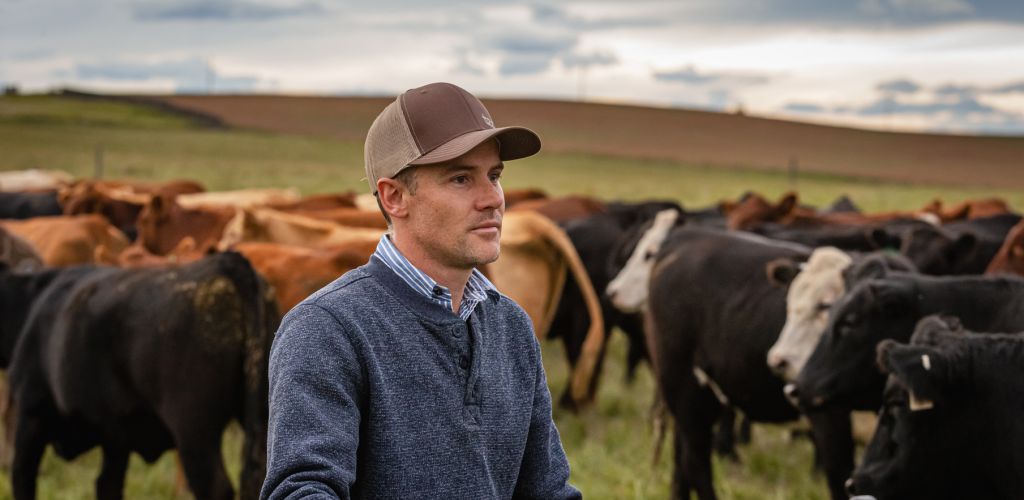"My view is that we don't own the world - we're borrowing it from future generations. This ranch isn't mine to personally do with as I please. I am a caretaker, I got it from my grandparents, and I'm taking care of it for my children or my grandchildren."
Ben Campbell 02 didn't expect to follow in his grandfather's footsteps. "Growing up, I wasn't a farm kid at all. I hardly knew anything about the family agriculture business."
As Alberta's Outstanding Young Farmers Program Award recipient for 2022, he has become a leading advocate for responsible ranching. "I consider myself an environmentalist and a conservationist. One of the main reasons I got into cattle wasn't because I wanted to be a rancher but to protect the environment. It's a healthy lifestyle for cows and produces healthy meat for people."
Ben attended university for physical education before switching to biology and ultimately earning a degree in civil engineering from the University of Alberta. After spending a year with Engineers Without Borders in Zambia, Ben returned to an office in Calgary. During this time, a chance conversation with a friend, who promoted grass-fed beef for its positive environmental impact, inspired him to explore ranching for the first time.
"I got four head of cattle my very first year working as an engineer, then the next year I had 17, then 27, and by my fifth year, I owned 400 head of cattle and was managing another hundred and fifty for another ranch."
It was a steep learning curve, he admits. After all, he knew nothing in particular about agriculture - or even how to ride a horse at first. "Who becomes a rancher with zero experience? My original goal was to have fifty cows and make a small profit."
Tullichewan Ranch, pronounced Tell-a-HUE-an, is Gaelic for 'Tilly's Hill' and was named for a Scottish castle the Campbell family once owned in the 1800s. "I enjoy being able to carry on what my grandfather (who owned the ranch) started. I'm living in the same house my grandfather lived in when he was my age."
Ben explains that conservation is at the heart of everything he does. "The ranch is treated like a national park; it's a living ecosystem (and) the cattle are just a part of the system. They are a tool I use to manage (the) grassland."
"My view is that we don't own the world - we're borrowing it from future generations. This ranch isn't mine to personally do with as I please. I am a caretaker, I got it from my grandparents, and I'm taking care of it for my children or my grandchildren."
The grasslands are one of the world's most endangered and least protected ecosystems, and he estimates that between 70 and 80 percent have been permanently lost. "The main way we lose grasslands is through cultivation. It's ploughed with a tractor and disc and then seeded with wheat, barley, and canola. I don't know if we even have a completely intact grassland ecosystem as it was before Europeans came."
Rather than isolate himself, Ben welcomes wildlife of all species to the ranch he owns and operates with his wife, Stephanie. "We have coyotes, foxes, grizzly and black bears, and we don't discourage, shoot, or trap them. They control our prey species, like gophers. We've got ponds and wetlands (that) are fenced off from cattle, so frogs and ducks can have a place to have nests and eggs and not get trampled."
His philosophy also extends to the infrastructure and day-to-day maintenance of the land. He recently installed enough solar panels to offset 150 percent of the ranch's electricity use, and he doesn't use herbicides or synthetic fertilizers on his pastures.
Ranching is also helping him rediscover his family's identity as custodians of the land. "My dad wasn't a farmer, but many people knew my grandfather. He died when I was younger, so for me to connect to him and who he was, and talk to people who knew him (is very special)."
With the Outstanding Young Farmers Award, Ben's hard work and innovation are now being acknowledged by his peers. "To receive that award as someone relatively new to the industry is a huge compliment."
“I think that one of the many things I absorbed from my time at STS was respect for nature and the outdoors. We learned that adult life is more than just paying the bills. We were challenged to make an impact. It’s not my role in life to extract the most value for myself as possible but to make a mark and leave the world in better shape than I inherited it.”
Published in the 2023 edition of Optimum Magazine
